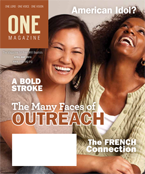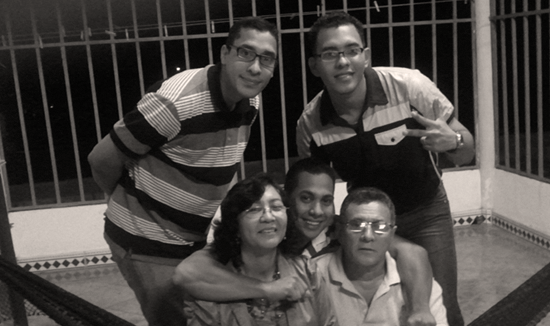
April-May 2013
The Many Faces
of Outreach
------------------
|

A New Song for Uri
Written by Uri Gonzalez, Translated by Steve Lytle
The Life, Conversion, and Ministry of Euribiades Gonzalez Vargas
I attended first grade in Cañita in 1962, since there was no school in Buenos Aires, the town where I lived with my family. Every Friday, I waited anxiously for the last class to be over so I could go home and see my family in the mountains.
One Friday during the Christmas season, we learned we should not leave school because a “gringo” was coming to bring toys, candy, and other gifts. Up to that time, I had never received a toy for Christmas because of the living conditions in the mountains and because, in our culture, things of that sort weren’t very important.
The hour arrived and I met Thomas Willey, Jr., for the first time. He arrived in his own plane and started passing out gifts right and left. I received a little purple Volkswagen car. This gave me incredible joy. For a little boy my age, and one living in the “campesino” (Latin American peasant or farmer) culture, the joy was more than I could possibly expect to experience.
In later years, I often saw Tom Willey around Cañita transporting sick people in his plane or by car. At that time, public transportation was terrible, and the roads were mud holes. People went down the Bayano River for medical help. Sometimes, small planes were available, but campesinos with few resources had little access to the larger towns and cities.
I went to fifth and sixth grades in the Las Mendozas School in Chorrera, 50-60 miles away from home. I lived with an uncle. Every night we prayed the rosary. I heard this so much during those two years that I learned it by memory. I left Las Mendozas in 1967 and returned to Buenos Aires. As a first-class reciter of the rosary, when someone died I was asked to come and intercede on behalf of the dead. For my part, I continued to ask priests and others who recited the rosary about the reasons behind the repetition of the litanies and other things related to the Catholic tradition. I never received a satisfactory response.
I enrolled in the José Dolores Moscote High School in 1968, and the professors began to teach us things contrary to Christianity, since most of them were atheists. Their influence was so strong that I became an atheist, completely removed from all things religious. I began to direct my life toward vices such as alcohol and other things.

Photo: Uri Gonzalez (bottom right) with his family.
Some of Tom Willey’s disciples, men like Daniel Dorati, Raúl Sanes, Nicolás Valdés, and others, arrived in Buenos Aires to preach the gospel of Jesus Christ. By the end of 1976, many people in Buenos Aires had been converted, including all my family…except for me.
I am grateful to God for the patience, love, and kindness of those who are now my brothers in Christ. They did not faint in sowing the seed, in spite of my offensiveness and the diatribes to which I submitted them when they dared to preach to an atheist.
One day, I threw out a challenge to God. I told Him that if He in truth existed as they said, I would believe only if He would show me He really did exist, but otherwise, no.
Sometime in 1977, during my fourth year in the Panama Nautical School, all my family left for a church meeting on a Friday. They invited me, but I said I wouldn’t meet with hypocrites and had to study for a test on Monday. That was a lie. I was planning to go to a dance that weekend where they played the kind of music I liked. Something happened that night, and I ended up not going anywhere.
Instead, I fell asleep. I woke up during the night, and my family hadn’t returned from the service. The strangest thing was that I was weeping when I awakened. As an atheist, I believed that men didn’t cry. I laughed at myself, since I was doing something I had criticized. Then I thought of the challenge I had made to God, and I began to cry in earnest. I fell to the ground and confessed my sins to Jesus. I was baptized April 26, 1978, in Buenos Aires. Since that experience with the Lord, no one has had to invite me to go to church!
I began to attend First Free Will Baptist Church in Panama City. Tom Willey, Jr. and later Gabriel Pérez pastored this church.
We lived in San Miguelito, a heavily populated area of Panama City. Yet, we continued to cross the city to attend First Church. Brother Alvaro Larrahondo from Colombia organized a group of us as a new church in our section of town in 1986. From there, we continued to grow, and in 1990, when Pastor Alvaro moved to the U.S. with his family, I began my pastoral ministry with the church for the glory of God.
Brother Alvaro had three elders (deacons) in the church, and it was his vision that one of us would take his place when he left. The others didn’t accept the challenge, and I was the last one he approached. I accepted the challenge of leading the church without formal training. I understood that for that time (according to 2 Timothy 2:1-2), God was leading me to be strong in the grace of God and that faithfulness precedes giftedness. For that reason I said, “If I am faithful, the Lord will help me to become ‘able’ in His work.” I have continued until this present time and will for as long as the Lord determines, with the help of His Holy Spirit.
Steve Lytle adds:
Uri González has pastored the San Miguelito church, known as “Templo Manantial de Vida” (Fountain of Life Temple), for 20 years. He and his wife Xenia have faithfully served the congregation and the denomination in a number of roles. They have raised three fine sons. Two of the boys are now married, and the González have two grandchildren. The youngest son, Eliezer, is engaged to be married. Middle son Eli is leading a new church plant in a heavily populated area on the outskirts of Panama City called Santa Librada. In January 2013, Uri was elected president of the Panamanian National Association.
Uri is well-known for his music. Inspired by the testimony of his Uncle Alberto, who was killed when a tree fell and crushed him in Buenos Aires, Uri followed Alberto’s example and began composing “décimas,” a musical form in which lyrics are sung campesino style, and the verses adhere to syllabic rules of rhyme and meter. He is much in demand in the evangelical community, and these songs give him yet another way to glorify the Lord. He is also a good preacher-teacher.
|
|

